
It is as if life has come to a standstill. The days ahead seem to be filled with worry for the common people. Just as the traffic signal forces you to stop, inflation has halted the aspirations of millions of people.
Across India, price rise has become the most discussed topic. One after the other, the prices of essential commodities have been rising at an alarming rate. With the deregulation of petrol prices, the future looks grim for the Indian consumers.
"How can we call India a developing country when the majority is only thinking about where the next meal will come from, and how? What do we do when our government fails miserably to safeguard our interests and makes us poorer? The government has been able to do nothing for the people. The whole system is so corrupt. Will it ever improve?" -- These are some sentiments that the common people we spoke to have aired.
Click NEXT to see what the aam aadmi is saying on price rise...
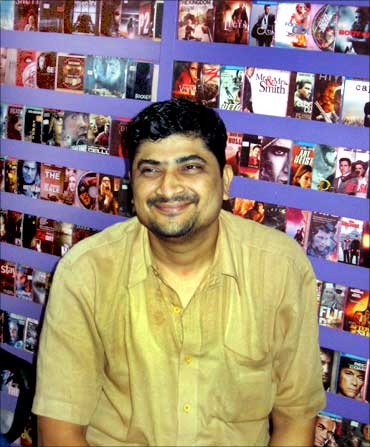
"This is the only business where I cannot hike the prices even when the price of everything else is rising," says H R Sanghavi, who runs a VCD/DVD shop-cum-library. The rent of my shop has doubled in the last two years. As prices rise, I will have to pay more to my delivery boys. My savings have gone down. Luckily I managed to buy a house 10 years ago when the prices were not so high. Now, I am planning to sell off the house and buy a cheaper one.
"The government has failed miserably in doing anything for the people. The whole system is so corrupt. No matter how honest a person is, the moment he joins politics, he becomes a part of the corrupt system and he plays his part in the money-making exercise. Honesty is the only way for anyone to succeed in life, they say. But is anyone among our leaders honest?
People are now only thinking about how they can survive. The situation is getting worse, this will lead to many more cases of fraud and forgery. More people will resort to crime. For people like me, it is a cut in to our savings, but for the poor it is about staying alive. Everyday, there is a new 'tension' in our lives.
"I spend so much running this shop, selling CDs/DVDs and lending them legally. But there are so many people out on the street selling pirated CDs. The police does not catch them. If I keep a pirated CD, I will be put behind the bars, but others get away. This is how our system functions.
"I don't see any kind of progress in our country. I have stopped voting. Irrespective of which party you vote for, life continues to be the same: full of problems and misery. I can't even imagine where we are headed to."
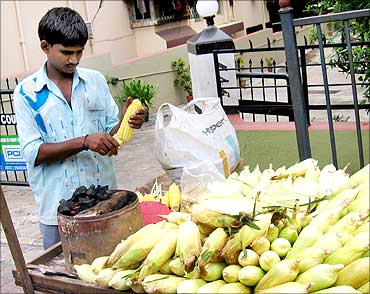
"We have no choice but to work harder. We cannot cut down on eating. Luckily, I don't eat dal since childhood. This has proved to be a blessing now. I sell things on this handcart. I used to save much more earlier. There seems to be no end to the price hike. I have managed to build a small house and buy a plot of land back home in Benares.
"I don't know the reasons for the price hike but I think it is due to bad governance. I have never voted and will never vote in my life. These politicians come to you when they need you during elections. After they win, they won't even recognise you."
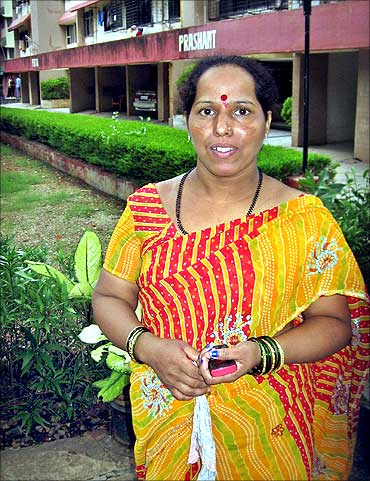
Supriya Santosh
"The price hike is the biggest blow to the poor. It will kill us. I dread to go to the vegetable shop these days. Bottle gourd, one of the most cheapest vegetables is now Rs 40 a kg. I get Rs 350 per job, be it cleaning vessels or mopping. For cooking, I get paid Rs 1,500-2,000. Our wages have not changed when the prices of vegetable and just about everything has gone up by almost 6-10 times."I just want my children to do well. I am very happy that my daughter passed her tenth standard this year. She wants to be an engineer. Unless you have a good job, you just cannot survive here. I also have a loan I took when I was hospitalised some time back. Life is getting from bad to worse. We will only get poorer.
"Who will listen to our woes?"
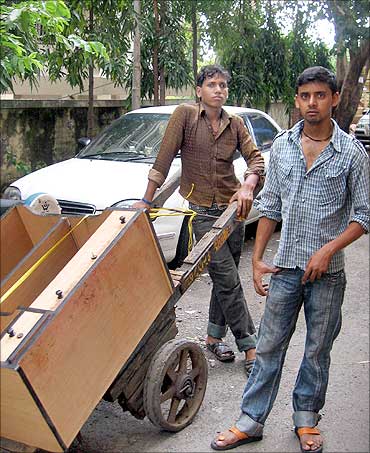
"We came to Mumbai a year ago from Uttar Pradesh. We are now working in a scrap dealer's shop. We had great expectations when we came to Mumbai. But now we are in a dilemma. Did we do the right thing by shifting to this city? Our parents and siblings need our support so we have to really work harder to save more.
"Our day starts at 10 and ends after 10 long hours. We do take breaks in between but it's a tough job. With the price rise, we won't be able to send as much as we used to send earlier. Sometimes, we even skips meals to save more. But how much can you cut down on food? We can cut down on other extra things but not so much on food. We don't know why this is happening. We hope things will get better."
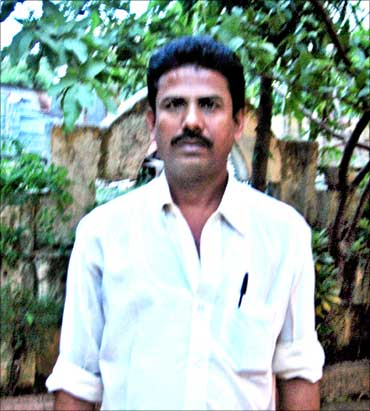
"I have two small daughters and parents to take care of in Bihar. My village has no electricity. There are hardly any jobs there. This is better than being in the village but living in this city has become very expensive. I have spent nearly 15 years in Mumbai. The price rise is shocking and there seems to be no sign of this coming down."
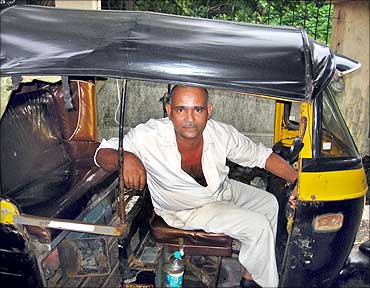
Ram Mishra, who drives an autorickshaw is not happy, despite the fact that the fares have just been increased. The fares have been hiked for the first time in six years and it is just not enough. The CNG price has gone up by Rs 6 per kg.
Mishra, who has been in Mumbai since 26 years, feels the government is 'very unfair'. "There is no logic behind the way the fuel prices are hiked. People complain that the fares are high. But how do we live? Both my children are studying. I do not want them to be like me," he laments.
"Luckily, my elder son is doing his graduation and younger one is in school. My only aim is to work overtime and somehow runt he house and be able to help them be independent."
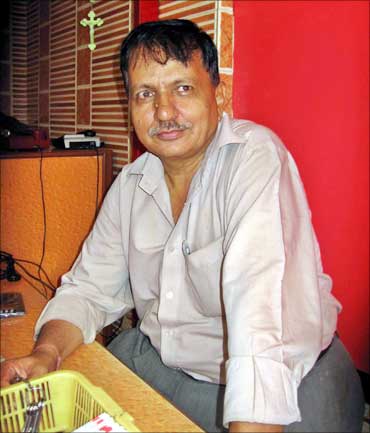
"Mumbai has lost its charm, with several instances of bomb blasts, clannish mentality of people and most important of all, the cost of living has really soared. Our savings have been badly hit and I blame it on the wrong policies of the government."
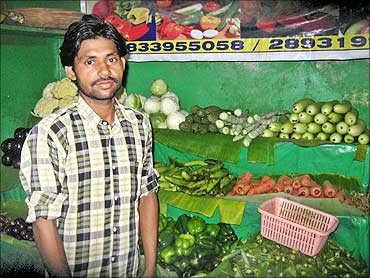
"We go through a lot of hardship to keep the shop running well. We work for 10 hours everyday. The cheapest vegetable is cabbage at Rs 32 per kg and the most expensive vegetable is green peas at Rs 150. The prices of most vegetables have doubled. People go on asking the prices before taking any vegetable," he adds.
"Our profit has gone down by 10-15 per cent. How can we cut down on food and basic amenities? We have to live with this reality."
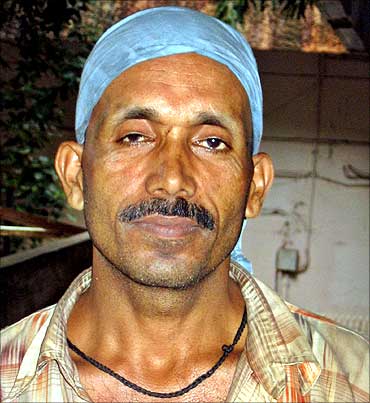
"When I come back here and go to a shop to buy rice and wheat, the price is shocking. It is the middlemen who make all the money. The money they make is unaccounted for. We have to keep struggling all our lives. I have not cut down on eating, if I don't eat well, I wont be able to work at all. Poor people like us have no future here."
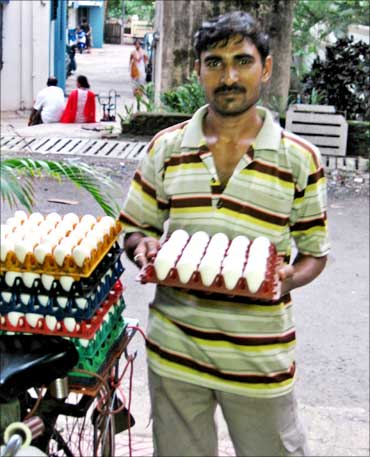
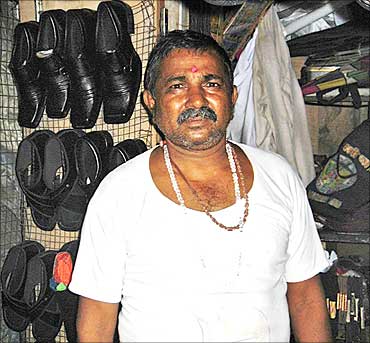
"As a cobbler, how much can one earn? With prices going up, it is so difficult to run a house. Education is getting more expensive as well. If we don't send them for private tuition they lose a chance. The poor need an opportunity to prove themselves as well," says Raju.
He has never been so tense about expenses as he is now. Besides mending shoes, he also repairs umbrellas and makes chappals and shoes. He only hopes he can save enough to give good education to his sons.
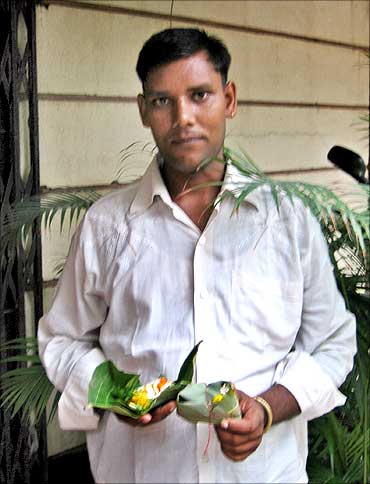
Manoj makes a living by selling flowers. "The prices of flowers have gone up but I have not increased the prices. People get very disappointed. I have been giving flowers for puja to many houses for years. I feel I will lose customers if I hike prices.," he says.
"I sell a small pack for Rs 2. Day-to-day expenses are rising and it is difficult to make ends meet."